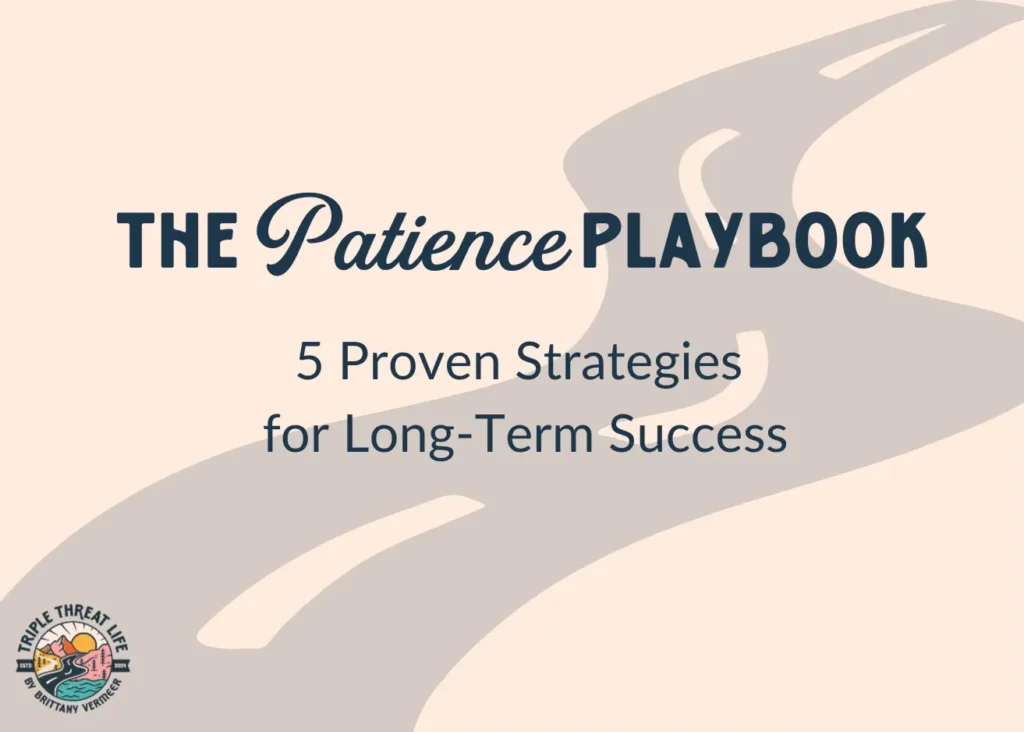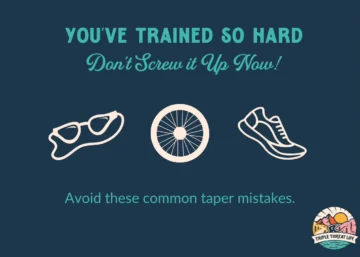
I have a confession to make.
The person I am today is very different from the person you would’ve met five years ago.
A different sport. A different job. A different focus.
As a reader of this blog, you fall into one of two categories. Some of you know the me that was then, and some of you know the me that is now.
In my previous life, I was a competitive equestrian. But to say it like that without any further explanation would downplay the years of grinding, and falling, and failing, and getting back up again, and finding success.
I wasn’t just competitive. I was damn good. I was elite. After almost 20 years in the sport, I won 10 World Championship titles (6 wins, and 4 reserves if memory serves correctly) and was the #1 ranked rider in the country.
Then, I abruptly switched gears. Now, I’m chasing endurance in triathlon.
The journey from being at the very top of one field to completely starting over in another is… a paradigm shift. You go from knowing everything to knowing absolutely nothing.
In the beginning, it’s easy to get frustrated with slow progress. That can lead to lack of commitment and low motivation. All this makes it difficult to stay focused on your goals.
Throughout this journey, this is what I’ve learned: Patience is one of the hardest, yet most powerful, skills you’ll ever master in pursuit of success.
If you watched coverage of the Paris Olympics, you probably saw a Visa commercial that features Pharrell Williams and Skye Brown. The short film dispels the myth of the prodigy, the overnight success.
The truth is there’s no such thing as an overnight success. It’s a lie.
Whether it’s an Olympic athlete or a Grammy-winning singer, all we see is the end result. We don’t see the years of hard work, the failures, and hard times that have lead to that shining moment of success.
“Show me your prodigies. Your wunderkinds. Overnight successes… Show me the unfairly gifted. The business masterminds. The once-in-a-generation talents. And we’ll show you the late nights. The early risers. The tough days. The relentless fighters taking small steps forward to make the big things happen.”
Not only is it masterful marketing tying in with Visa’s tagline- “Every step forward takes you closer to where you want to be,” it’s a great lesson in patience.
5 Proven Strategies for Long-Term Success
Today, we’re going to look at excerpts of that letter and see how they relate to 5 proven strategies for long term success. Then, I’ll explain the mindset shift that’s needed in order to put each strategy into action.
#1-Learn to view setbacks as stepping stones.
In fact, this impatience in dealing with frustration is the primary reason that most people fail to achieve their goals. Unreasonable expectations time wise, resulting in unnecessary frustration, due to the perceived feeling of failure. Achieving the extraordinary is not a linear process.”
Because there’s no such thing as an overnight success, we must accept the reality that it’s going to take considerable time to achieve a worthy goal. Let’s be honest, if something was easy to accomplish, would it mean as much to you as something that took years of sweat and hard work?
A friend of mine calls this playing the long game. You have a plan that you’re implementing now, but all your efforts are directed towards a goal in the future. It’s something you hope to achieve months or years down the road.
Expect that you probably won’t see big gains for quite some time. And that’s ok because you’re investing sweat equity towards the future. One day, that work will pay off.
During this journey, we should expect to encounter setbacks, both minor and major.
I interviewed pro triathlete, Emma Pallant-Browne, a few months back about how to overcome setbacks. During our interview, she said something that really resonated with me. “A setback is just a step back to give you more of a run up to have a bigger leap forward.”
Mindset Shift: Temporary frustration is a normal part of the journey towards excellence, but your ability to deal with these bumps in the road will determine whether or not you succeed. Instead of viewing setbacks as failures, envision them as stepping stones that are a necessary part of the journey toward your ultimate goal.
#2- There are no shortcuts. The secret to success is an uncompromising work ethic.
A blue collar work ethic married to indomitable will. It is literally that simple. Nothing interferes. Nothing can sway you from your purpose. Once the decision is made, simple refuse to budge. Refuse to compromise.”
People love a quick fix. A hack. A shortcut.
But with long-term success, there’s no such thing.
An uncompromising work ethic means relentless dedication. It means daily consistency and maintaining high standards, even when your motivation wanes or progress seems slow.
It doesn’t take anything special. Simply be stubborn as hell. (I’m great at this, ask my husband).
All you need is a stubborn refusal to budge. Be disciplined. Put in the work that’s required. Don’t get discouraged by setbacks (stepping stones remember!).
What’s an indomitable will? It’s an unyielding and resolute determination that cannot be subdued or overcome. A person with an indomitable will has the mental strength and fortitude necessary to persevere despite challenges and opposition.
Mindset Shift: Be accountable and take full responsibility for your actions. Be self-disciplined. Commit fully to your goal, no matter how challenging. We can persevere through obstacles and setbacks if we keep the big picture in mind by “playing the long game.” When faced with disappointment, or wavering commitment, remind yourself about your long-term objective.
#3- Appreciate the journey and expect there will be bumps in the road.
Focus is something I struggle with. Not long-term focus, but short-term focus.
I have the attention span of a squirrel, and my brain runs a thousand miles a minute. I’m always thinking of new ideas, different ways to do things, and creating stories in my head. (That’s why I’m a writer.)
But we’re talking about long-term focus: staying committed to a goal that you might not realize for six months, a year, or even five years down the road.
Are you that committed?
In triathlon, long course racing makes this easier. Say thank you to Ironman for helping us develop this skill.
We sign up for a 70.3 or a 140.6 and have 6-12 months to prepare. We work every day swimming, cycling, and running with an eye towards that end goal. There’s a clear purpose for every workout and, as the mileage increases, we know we’re getting closer towards achieving a goal that has been months or years in the making.
The thing is the culmination of the training is only one part of the process. Then, you actually have to complete the race, which is a journey in and of itself.
Far more time will be spent during the journey training for a long course triathlon than actually doing the event itself. Therefore, be able to enjoy and appreciate the process.
One of my favorite quotes is from Ursula K. Le Guin: “It is good to have an end to journey towards; but it is the journey that matters, in the end.”
Mindset Shift: If there’s one thing we can learn from endurance sports it’s that you won’t find happiness, or whatever you’re searching for, at a finish line. Far more time is spent during the journey than those fleeting moments at the conclusion. So learn to appreciate the road to success.
#4- Failure is a necessary part of achieving success.
Throw out a timeline. It will take what it takes.”
Failure is a word that triggers intense emotion, almost revulsion. You probably don’t even like reading it.
Failure? That’s something I want to avoid at all cost!
But what this excerpt explains is that failure is a normal part of the growth process. In fact, it’s exposure to challenging situations that builds resilience and mental strength.
Then, it goes a step further by saying that if you aren’t encountering defeat or failure on a regular basis then you aren’t trying hard enough.
How’s that for a motivational kick in the pants?
In addition to developing mental strength during training, you may encounter challenging scenarios on race day. Every time you successfully navigate one of those experiences, you build confidence knowing that you can face hard things and come out on the other side.
In addition to navigating these down moments, something else that causes us to stumble is when we set an unrealistic timeline for success.
Scientifically speaking, the type of physiological adaptation required to become really good at endurance events doesn’t happen overnight. It takes years.
So no wonder athletes get frustrated when they don’t see immediate progress! This leads to disappointment, injury, and burnout.
I’ve learned that more than any other sport, real improvement in triathlon takes time. Not days, or months, but years.
Mindset Shift: Whether it’s a failure or challenging situation, view these experiences as opportunities for growth. Do you view failure as final? Or as an opportunity to learn and improve? We all have strengths and weaknesses as athletes, but we can take a proactive approach by viewing these not as liabilities, but as opportunities.
#5- Make a single decision and stick with it.
Let me ask you a question. And be honest.
Are you committed? Or are you just interested?
Are you completely and absolutely committed to doing everything within your power to achieve your goal?
Or are you just interested in seeing what that looks like?
Staying committed to a long-term goal isn’t easy. It is easy to stray off the path when the goal seems so far off in the distance. But the work you do day in and day out is what will help you reach that goal.
Quitting won’t get you there any faster. Quitting won’t get you there at all.
You have to be stubborn in resolve, unwavering in dedication, and show daily consistency in order to achieve long-term success. If you can do that, then there’s almost nothing you can’t do.
Mindset Shift: All it takes is a single decision. Decide what you want to achieve and be ruthless in dedication to, and pursuit of, your goal.
By learning that:
- Setbacks are only stepping stones.
- There are no shortcuts. The secret to success is an uncompromising work ethic.
- You must learn to appreciate the journey and expect there will be bumps in the road.
- Failure is a necessary part of achieving success.
- Make a single decision and be ruthless in dedication to it.
You will achieve long-term success in whatever you choose to do.


